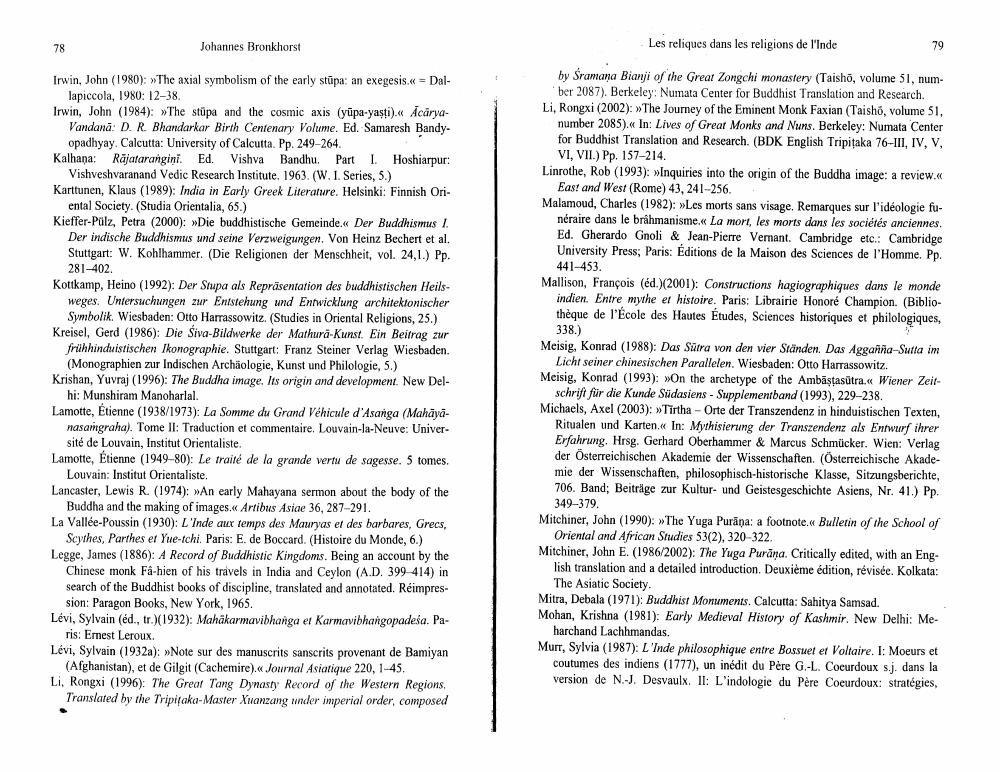________________
Johannes Bronkhorst
Les reliques dans les religions de l'Inde
79
Irwin, John (1980): »The axial symbolism of the early stūpa: an exegesis. = Dal
lapiccola, 1980: 12-38. Irwin, John (1984): »The stupa and the cosmic axis (yüpa-yasti). Acārya
Vandana: D. R. Bhandarkar Birth Centenary Volume. Ed. Samaresh Bandy
opadhyay. Calcutta: University of Calcutta. Pp. 249-264. Kalhana: Rajatarangini. Ed. Vishva Bandhu. Part Hoshiarpur:
Vishveshvaranand Vedic Research Institute. 1963. (W. 1. Series, 5.) Karttunen, Klaus (1989): India in Early Greek Literature. Helsinki: Finnish Ori
ental Society (Studia Orientalia, 65.) Kieffer-Pulz, Petra (2000): Die buddhistische Gemeinde. Der Buddhismus I.
Der indische Buddhismus und seine Verzweigungen. Von Heinz Bechert et al. Stuttgart: W. Kohlhammer. (Die Religionen der Menschheit, vol. 24,1.) Pp.
281-402. Kottkamp, Heino (1992): Der Shupa als Repräsentation des buddhistischen Heils
weges. Untersuchungen zur Entstehung und Entwicklung architektonischer
Symbolik. Wiesbaden: Otto Harrassowitz. (Studies in Oriental Religions, 25.) Kreisel, Gerd (1986): Die Siva-Bildwerke der Mathura-Kunst. Ein Beitrag zur
friihhinduistischen Ikonographie. Stuttgart: Franz Steiner Verlag Wiesbaden.
(Monographien zur Indischen Archäologie, Kunst und Philologie, 5.) Krishan, Yuvraj (1996): The Buddha image. Its origin and development. New Del
hi: Munshiram Manoharlal. Lamotte, Etienne (1938/1973): La Somme du Grand Véhicule d'Asanga (Mahāyā
nasangraha). Tome II: Traduction et commentaire. Louvain-la-Neuve: Univer
sité de Louvain, Institut Orientaliste. Lamotte, Étienne (1949-80): Le traité de la grande vertu de sagesse. 5 tomes.
Louvain: Institut Orientaliste. Lancaster, Lewis R. (1974): An early Mahayana sermon about the body of the
Buddha and the making of images. Artibus Asiae 36, 287-291. La Vallée-Poussin (1930): L'Inde aux temps des Mauryas et des barbares, Grecs,
Scythes, Parthes er Yue-ichi. Paris: E. de Boccard. (Histoire du Monde, 6.) Legge, James (1886): A Record of Buddhistic Kingdoms. Being an account by the
Chinese monk Få-hien of his travels in India and Ceylon (A.D. 399-414) in search of the Buddhist books of discipline, translated and annotated. Réimpres
sion: Paragon Books, New York, 1965. Levi, Sylvain (éd., tr.)(1932): Mahakarmavibhanga et Karmavibhangopadeśa. Pa
ris: Emest Leroux. Levi, Sylvain (1932a): »Note sur des manuscrits sanscrits provenant de Bamiyan
(Afghanistan), et de Gilgit (Cachemire). Journal Asiatique 220, 1-45. Li, Rongxi (1996): The Grear Tang Dynasty Record of the Western Regions.
Translated by the Tripitaka-Master Xuanzang under imperial order, composed
by Sramana Bianji of the Great Zongchi monastery (Taisho, volume 51, num
ber 2087). Berkeley: Numata Center for Buddhist Translation and Research. Li, Rongxi (2002): >>The Journey of the Eminent Monk Faxian (Taisho, volume 51,
number 2085). In: Lives of Great Monks and Nuns. Berkeley: Numata Center for Buddhist Translation and Research. (BDK English Tripitaka 76-III, IV, V,
VI, VII.) Pp. 157-214. Linrothe, Rob (1993): »Inquiries into the origin of the Buddha image: a review..
East and West (Rome) 43, 241-256. Malamoud, Charles (1982): »Les morts sans visage. Remarques sur l'idéologie fu
néraire dans le brahmanisme. La mort, les morts dans les sociétés anciennes Ed. Gherardo Gnoli & Jean-Pierre Verant. Cambridge etc.: Cambridge University Press; Paris: Éditions de la Maison des Sciences de l'Homme. Pp.
441-453. Mallison, François (éd.(2001): Constructions hagiographiques dans le monde
indien. Entre mythe et histoire. Paris: Librairie Honoré Champion. (Bibliothèque de l'École des Hautes Études, Sciences historiques et philologiques,
338.) Meisig, Konrad (1988): Das Sutra von den vier Ständen. Das Aggarna-Sutta im
Licht seiner chinesischen Parallelen. Wiesbaden: Otto Harrassowitz. Meisig, Konrad (1993): On the archetype of the Ambasasutra. Wiener Zeit
schrift für die Kunde Südasiens - Supplementband (1993), 229-238. Michaels, Axel (2003): Tirtha - Orte der Transzendenz in hinduistischen Texten,
Ritualen und Karten. In: Mythisierung der Transzendenz als Entwurf ihrer Erfahrung. Hrsg. Gerhard Oberhammer & Marcus Schmücker. Wien: Verlag der Osterreichischen Akademie der Wissenschaften. (Osterreichische Akademie der Wissenschaften, philosophisch-historische Klasse, Sitzungsberichte, 706. Band; Beiträge zur Kultur- und Geistesgeschichte Asiens, Nr. 41.) Pp.
349-379. Mitchiner, John (1990): The Yuga Purana: a footnote. Bulletin of the School of
Oriental and African Studies 53(2), 320-322 Mitchiner, John E. (1986/2002): The Yuga Purana. Critically edited, with an Eng
lish translation and a detailed introduction. Deuxième édition, révisée. Kolkata:
The Asiatic Society Mitra, Debala (1971): Buddhist Monuments. Calcutta: Sahitya Samsad. Mohan, Krishna (1981): Early Medieval History of Kashmir. New Delhi: Me
harchand Lachhmandas. Murr, Sylvia (1987): L'Inde philosophique entre Bossuet et Voltaire. I: Moeurs et
coutumes des indiens (1777), un inédit du Père G.-L. Coeurdoux s.j. dans la version de N.-J. Desvaulx. II: L'indologie du Père Coeurdoux: stratégies,




